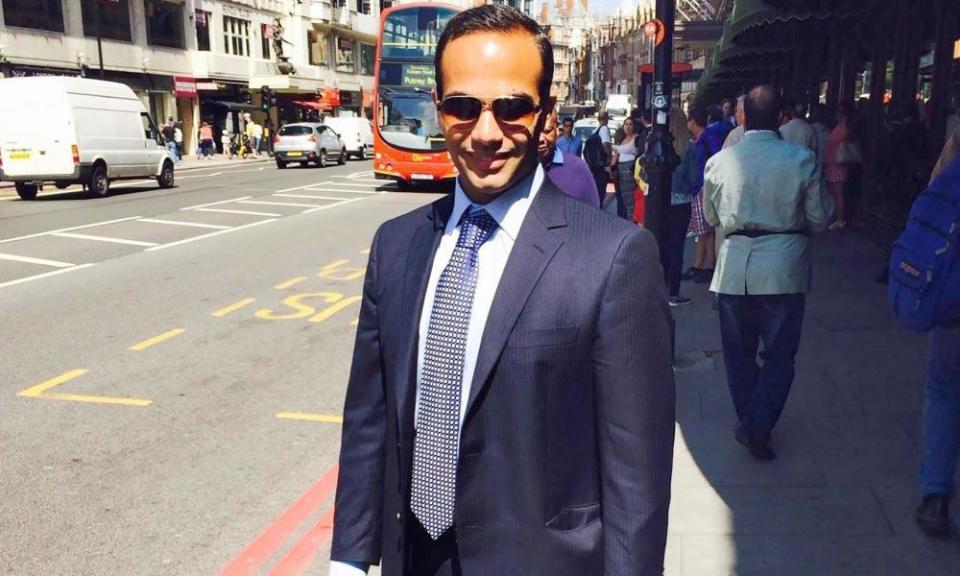Trump aide told Australian diplomat Russia had dirt on Clinton – report
George Papadopoulos spoke to high commissioner Alexander Downer at London bar in May 2016, catalyzing FBI investigation, New York Times reports

The FBI reportedly launched its investigation into Russian meddling in the 2016 US election after George Papadopoulos, then a foreign policy adviser to Donald Trump, told an Australian diplomat that Moscow had damaging information about Hillary Clinton.
According to a report published by the New York Times on Saturday, Papadopoulos made the revelation to Alexander Downer, the Australian high commissioner to the UK, “during a night of heavy drinking” at the Kensington Wine Rooms in London in May 2016.
Papadopoulos reportedly told Downer that Russian officials possessed thousands of emails that could harm Clinton’s candidacy.
Australia is part of the “Five Eyes” intelligence alliance, with the US, UK, Canada and New Zealand. When WikiLeaks began publishing hacked emails from Democratic officials two months later, Australian officials passed the information to their US counterparts, the Times report stated. The FBI then began its investigation.
A White House lawyer, Ty Cobb, declined to comment, saying in a statement that the administration was continuing to cooperate with the investigation now led by the special counsel Robert Mueller “to help complete their inquiry expeditiously”.
In October, Papadopoulos pleaded guilty to lying to the FBI about the nature of his communications with the Russians. He is said to have been cooperating since July with Mueller, who was appointed in May to oversee the federal inquiry into links between Trump and Russia.
The White House has sought to portray Papadopoulos as a low-level staffer whose contacts with the Russians were made independently. The Times report said court documents showed Papadopoulos repeatedly tried to coordinate a meeting between Trump and the Russian president, Vladimir Putin, and notified senior campaign officials of his efforts.
The Times report comes as Republicans have escalated their attacks on the independence of Mueller’s investigation, zeroing in on the FBI’s use of a dossier regarding links between Trump and Russia compiled by a former British spy, Christopher Steele.
The 2020 election
The most likely price Trump would pay, if he were perceived guilty of wrongdoing, would be a 2020 re-election loss. He can't afford to lose many supporters and expect to remain in office. Any disillusionment stemming from the Russian affair could make the difference. His average approval rating has hung in the mid-to-upper 30s. Every president to win re-election since the second world war did so with an approval rating in the 49%-50% range or better.
Congress
As long as Republicans are in charge, Trump is not likely to face impeachment proceedings or to be removed from office. A two-thirds majority in the Senate is required to remove a president from office through impeachment.
Public opinion
If public opinion swings precipitously against the president, however, his grip on power could slip. At some point, Republicans in Congress may, if their constituents will it, turn on Trump.
Criminal charges
Apart from impeachment, Trump could, perhaps, face criminal charges, which would (theoretically) play out in the court system as opposed to Congress. But it’s a matter of debate among scholars and prosecutors whether Trump, as a sitting president, may be prosecuted in this way.
Other
Robert Mueller is believed to have Trump’s tax returns, and to be looking at the Trump Organization as well as Jared Kushner’s real estate company. It’s possible that wrongdoing unrelated to the election could be uncovered and make trouble for Trump. The president, and Kushner, deny wrongdoing.
The dossier grew out of a commission by a conservative website to Steele’s firm, Fusion GPS, for opposition research during the Republican primary. It was later funded by the Democratic National Committee and the Clinton campaign.
The NYT report stated that Steele was interviewed by the FBI in October 2016, three months after he presented some of his findings to agents in Rome. But US officials told the NYT Steele’s research was not the catalyst for the counter-intelligence inquiry into Russian election interference.
Papadopoulos was appointed to Trump’s team of foreign policy advisers in March 2016. He reportedly offered to facilitate a meeting with Putin at a meeting including Trump that month.
Jeff Sessions, Trump’s attorney general, who led the foreign policy team, has claimed he told Papadopoulos to stand down. However, Sessions initially failed to mention the discussion while testifying before Congress. He later claimed that was because he had not recalled the meeting.
Papadopoulos edited an outline of Trump’s first major foreign policy speech in April 2016, in which the candidate expressed his desire to improve US-Russia relations. Papadopoulos, the Times reported, highlighted the speech to his contacts in Moscow, suggesting it was a “signal to meet”.

